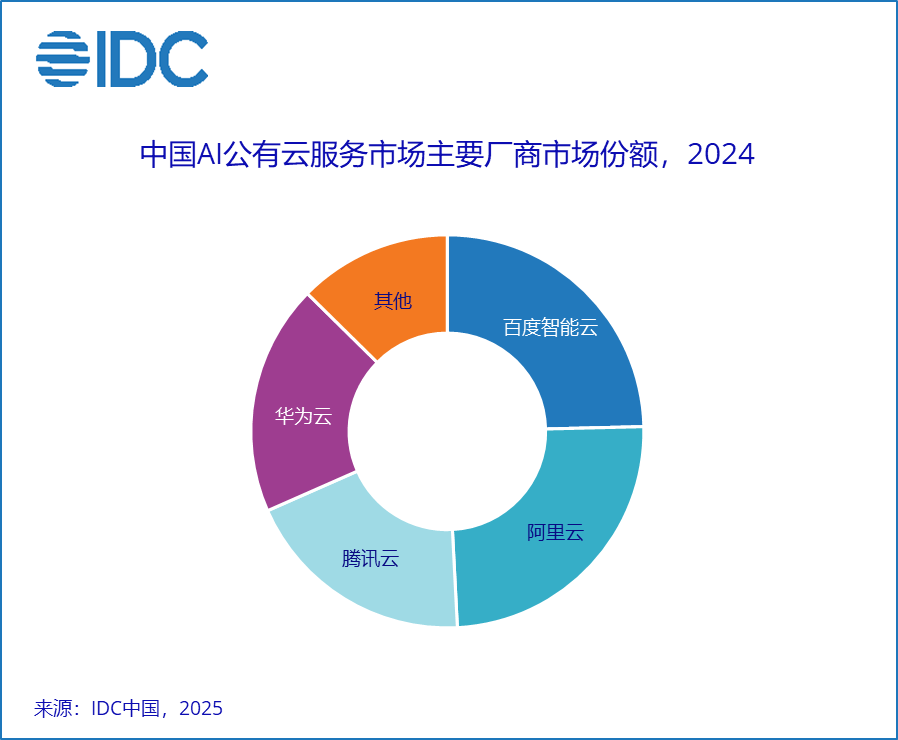Who is Leading the Chinese AI Public Cloud Market?
![]() 08/21 2025
08/21 2025
![]() 727
727

Key Points:
1. According to an IDC report, the Chinese AI public cloud service market grew by 55.3% year-on-year in 2024, with Baidu Intelligent Cloud and Alibaba Cloud tying for first place in market share.
2. The surge in AI cloud growth is fueled by technological advancements, evolving enterprise demands, and a robust cloud computing infrastructure. The AI cloud market represents a "relaunch" of the entire cloud computing industry.
3. Baidu Intelligent Cloud and Alibaba Cloud lead due to their distinct advantages: Baidu leverages AI to drive cloud innovation, offering strong technological products and deep industrial implementation, while Alibaba leverages its cloud to drive AI, boasting a robust public cloud foundation and significant ecosystem influence.
4. The transformation of the AI cloud service market by large models is just beginning and may fundamentally reshape the Chinese public cloud market. Future AI cloud competition is likely to focus on Baidu and Alibaba, evolving into a "contest of the strong."
Author: Chang Yuan
Editor: Key Points
The year 2024 marked a significant milestone for the Chinese AI public cloud market. According to the latest IDC report, the market size of Chinese AI public cloud services reached RMB 19.59 billion, registering a year-on-year growth of 55.3%.
In this booming market, Baidu Intelligent Cloud and Alibaba Cloud emerged as the clear winners, tying for first place in market share. Notably, Baidu Intelligent Cloud has been the market leader for six consecutive years, amassing a cumulative total of ten wins.
IDC data highlights two primary drivers of this rapid market growth: the proliferation of generative AI applications and the surge in demand for machine learning training and inference. The former signifies the explosion of enterprise application scenarios, while the latter reflects the increasing demand for computing power and tools at the infrastructure and platform layers. In essence, AI public cloud has transitioned to "enterprise-level implementation," propelling cloud vendors into a period of accelerated growth.
The IDC report defines the AI public cloud service market as "AI capabilities deployed on public cloud services," where enterprises can directly invoke AI capabilities provided by cloud vendors over the internet, eliminating the need to build their own servers. This market encompasses five major submarkets: computer vision, intelligent speech, conversational AI, natural language processing, and machine learning platforms.
Specifically, in these submarkets, Baidu Intelligent Cloud and Alibaba Cloud consistently rank among the top performers:
- The conversational AI market size was RMB 2.09 billion, with Alibaba Cloud and Baidu Intelligent Cloud ranking first and second, respectively.
- The intelligent speech market size was RMB 1.88 billion, with Alibaba Cloud and Baidu Intelligent Cloud again ranking first and second.
- The natural language processing market size was RMB 2.22 billion, with Baidu Intelligent Cloud, Huawei Cloud, and Alibaba Cloud ranking first, second, and third, respectively.
- The computer vision market size was RMB 8.1 billion, with Tencent Cloud and Baidu Intelligent Cloud ranking first and second.
The transformation of the cloud service market landscape by large models and AI is still in its infancy and has the potential to completely reshape the Chinese public cloud market. Lu Yanxia, Director of IDC China's Artificial Intelligence Research, emphasized, "Cloud vendors must have the courage and determination to comprehensively reshape cloud service products to help users establish a fully AI-driven architecture."
The wave of generative AI represents a watershed moment for AI public cloud, with the tied leadership of Alibaba Cloud and Baidu Intelligent Cloud embodying this trend.

Overview of the 2024 Market Share of Chinese AI Public Cloud Services
01 The Logic Behind the Explosion of AI Cloud: Why Now?
The rapid growth of AI cloud is not a coincidence but the culmination of several converging forces.
From the perspective of the overall public cloud market, China's public cloud market grew by 17.7% in the second half of 2024, marking the highest growth rate in two years. The previous significant cloud computing boom occurred from 2014 to 2020, but from 2021 to 2023, the mobile internet dividend peaked, and the cloud market growth rate declined. In 2023, the advent of AI and large models reignited growth expectations across industries. Enterprises began integrating AI into their business processes, driving organizational restructuring and efficiency improvements. China's public cloud market returned to a boom cycle, achieving double-digit growth.
Specifically for AI cloud, the timeline provided in the IDC report offers clear context:
- 2015-2022: AI applications were primarily focused on traditional scenarios such as intelligent customer service, OCR recognition, industrial quality inspection, and intelligent security, with more "point-based implementations."
- 2023: Large models entered industrial applications, driving upgrades in semantic and speech applications like intelligent customer service and speech conversion.
- 2024-2025: AI capabilities on the cloud will comprehensively shift to generative AI, forming a "platform-based upgrade."
- Second half of 2025: AI applications will further evolve into Agent form, creating a smarter and more autonomous application ecosystem.
From a broader perspective, the growth of AI cloud is fueled by three core drivers:
Firstly, the release of technological dividends. Large models have become the cornerstone of the AI industry. The standardization of model scale, reasoning ability, and application interfaces enables AI capabilities to be "supplied like water and electricity."
Secondly, evolving enterprise demands. From intelligent customer service and generative BI to industry-wide large models, more enterprises seek to quickly obtain AI capabilities on the cloud rather than building massive models themselves. AI cloud becomes the most cost-effective solution.
Lastly, a robust cloud computing infrastructure. Public clouds have laid a solid foundation at the IaaS and PaaS layers, and the explosion of AI cloud is akin to adding a layer of "intelligent operating system" to the existing cloud architecture.
Therefore, the AI cloud market is not merely an extension but a "relaunch" of the entire cloud computing industry. This explains the 55.3% year-on-year growth in market size in 2024, with the machine learning platform market even achieving 163.8% growth.
02 Baidu Intelligent Cloud and Alibaba Cloud: What Enables Their Leadership?
Despite significant investments from other players, it is currently Alibaba Cloud and Baidu Intelligent Cloud that dominate the AI public cloud. This is due to their differentiated advantages in strategic positioning, technological accumulation, and ecosystem layout.
Baidu Intelligent Cloud: Driving the Cloud with AI, Offering Strong Technological Products and Deep Industrial Implementation
Let's start with Baidu. As a "native player" in AI cloud, Baidu was the first Chinese vendor to propose the concept of "AI cloud." In 2019, it established "cloud + AI" as its core strategy, advocating "cloud intelligence integration and deep industrial involvement." Notably, at that time, cloud computing still focused on infrastructure as the core competitive point, and Baidu chose AI as its differentiating factor.
After years of deep cultivation, by the era of large models, Baidu Intelligent Cloud has accumulated robust product and technological capabilities, along with extensive industrial implementation experience.
In terms of products and technology, Baidu Intelligent Cloud has built a comprehensive full-stack AI infrastructure encompassing computing power, models, data, and applications. At the computing power layer, Baidu has deployed a cluster comprising 30,000 Kunlun chips. At the computing power scheduling layer, the Baidu GPU cloud platform can uniformly manage different underlying hardware. At the platform layer, the Qianfan large model platform provides enterprises with one-stop services for model invocation, development, deployment, and data intelligence.
This full-stack technology enables Baidu Intelligent Cloud to support enterprises' full-process needs from model training to business access. Simultaneously, it can serve diverse needs and adapt to complex scenarios.
Baidu Intelligent Cloud advances with "two legs." While building infrastructure, it also uses its own application products to test and refine underlying capabilities. A recent example is the launch of the world's first batch of AI digital employees, which integrate Baidu's core large models, digital human technology, and industry knowledge, achieving "out-of-the-box use." Behind this lies a customer-centric logic: enterprises can focus on their business pain points, obtaining professional, effective, and highly cost-effective solutions without concerning themselves with complex technical details.
Specifically, in terms of industrial implementation, Baidu Intelligent Cloud's approach is clear: delve deep into industries to solve core problems and enable AI to scale up in more industries.
Currently, Baidu Intelligent Cloud's implementation capabilities have been validated on a large scale across multiple industries. Public data shows that in the first half of 2025, Baidu Intelligent Cloud led in the number and amount of winning bids for large models in China. It has become the preferred AI cloud for 65% of central enterprises, 80% of systemically important banks, the top 10 new energy vehicle enterprises, and the largest number of key embodied intelligence enterprises.
For instance, the "Tiangong" robot, which recently gained popularity for winning the 100-meter "Flying Man Race" at the 2025 World Humanoid Robot Games, was supported by Baidu Intelligent Cloud.

In summary, Baidu Intelligent Cloud's competitiveness lies in "AI-driven cloud." It does not superimpose AI on existing cloud businesses but reconstructs the cloud from an AI perspective.
Alibaba Cloud: Driving AI with the Cloud, Boasting a Robust Public Cloud Foundation and Significant Ecosystem Influence
Now let's turn to Alibaba. As the "ecological overlord" of cloud computing, Alibaba Cloud's advantage lies in its strong public cloud foundation and ecosystem influence.
Alibaba Cloud has consistently ranked first in China's public cloud market share, particularly at the IaaS layer, where it excels in large-scale computing and storage, providing a solid computing power guarantee for AI training and inference.
In the AI era, Alibaba Cloud positions itself as a fundamental computing power provider, continuously increasing investment to consolidate its cloud foundation and ecosystem advantages.
Firstly, it continues to expand its investment in cloud computing infrastructure, focusing on AI and large models. Alibaba CEO Wu Yongming previously announced that the company will invest RMB 380 billion over the next three years to build cloud and AI hardware infrastructure, surpassing the total investment of the past decade.
Secondly, it adheres to the open-source route for models, enhancing its reputation in the community and attracting developers and enterprises by ranking high with its open-source Tongyi Qianwen series of models. Currently, Alibaba Cloud's large model matrix covers multiple modalities such as language, speech, vision, and code.
Thirdly, it invests in and acquires AI startups, integrating AI startups with Alibaba Cloud's AI infrastructure to consume training and inference computing power. Alibaba has invested in several of China's hottest AI unicorns, including Zhipu AI, MiniMax, Dark Side of the Moon, Zero One, and Baichuan Intelligence, all of which train large models on Alibaba Cloud.
Alibaba Cloud's path can be summarized as "cloud-driven AI": it leverages its underlying cloud advantages and uses AI as an upgrade and expansion.
Baidu and Alibaba take different paths. Baidu excels in AI technology and was the first to propose AI cloud, while Alibaba excels in cloud infrastructure and ecosystem. These differentiated advantages enable them to complement each other in different segments of the AI public cloud, ultimately forming a tied first-place market structure. Currently, both are among the few cloud vendors in China that have achieved profitability under non-GAAP.
03 Future Market Structure: AI Cloud Competition Will Focus on Baidu and Alibaba
The IDC report clearly states that large models and generative AI will comprehensively reshape the cloud service architecture. As AI applications gradually evolve towards Agent form, the core of future AI cloud market competition will no longer be computing power prices or model parameters but rather:
- The ability to provide AI-native application architectures for all industries;
- The establishment of a sustainable AI governance system;
- The reconstruction of the ecosystem to involve more developers and partners.
In these dimensions, Baidu and Alibaba are at the forefront.
For instance, at the ecosystem level, Baidu was the first company in the industry to propose the concept of "AI-native applications" and has increased investment in the developer ecosystem. By hosting the "Wenxin Cup" startup competition for several consecutive years, it has discovered outstanding entrepreneurs and attracted more to join the Baidu ecosystem. It is more likely to lead in constructing new application paradigms in the Agent era.
In 2024, the 55.3% growth rate of the AI public cloud market and the tied first-place ranking of Baidu and Alibaba marked a new development stage for China's cloud computing.
Upon reading the report, my immediate impression is that the AI cloud service market landscape is undergoing a transformative shift driven by large models, a process that is just beginning and may lead to a complete restructuring of the Chinese public cloud market. On one hand, the pricing model for large model cloud products is transitioning towards a token-based system; on the other, large model-based applications are significantly boosting the demand for infrastructure products, such as computing power. Undoubtedly, models and applications will dominate the AI era, presenting a solid foundation for the sustained growth of Baidu Intelligent Cloud and Alibaba Cloud in the future.
Currently, the Chinese public cloud market can be delineated as a "5+3" structure, comprising five technology cloud providers (Alibaba Cloud, Huawei Cloud, Tencent Cloud, Baidu Intelligent Cloud, and Volcano Engine) and three telecom operator clouds (China Telecom Tianyi Cloud, China Mobile Cloud, and China Unicom Cloud). Collectively, these eight entities dominate the market share.
Cloud computing is characterized by a robust network effect. Drawing parallels from overseas markets, the US market is predominantly controlled by Amazon, Microsoft, Google, and Oracle. Conversely, China boasts over 15 cloud vendors, fostering a highly competitive environment marked by intense price wars and a scarcity of profitable players.
Future AI cloud competition is unlikely to witness a "hundred flowers blooming" scenario but will instead morph into a "contest of titans." The leadership positions of Baidu and Alibaba are not merely the outcome of technological and ecological accumulation but also signal that in the coming years, the narrative of China's AI cloud market will revolve primarily around these two giants.
In essence, the IDC report concludes that AI is transforming the cloud, and the cloud, in turn, is reshaping AI. At this juncture stand Baidu and Alibaba, who have made long-term investments and possess the deepest foundations in this intertwining field.






